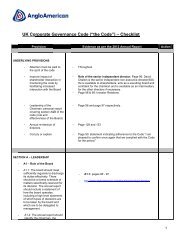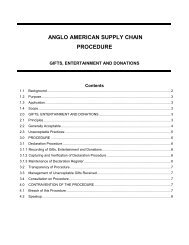Corporate Citizenship for a New World - Anglo American South Africa
Corporate Citizenship for a New World - Anglo American South Africa
Corporate Citizenship for a New World - Anglo American South Africa
You also want an ePaper? Increase the reach of your titles
YUMPU automatically turns print PDFs into web optimized ePapers that Google loves.
And would growth in China and the developing world continue at a strongpace or instead weaken or stall?As the year progressed, the weight of these worries dented the confidence offinancial markets and led to a period of significant volatility. Aversion to risk led tosignificant falls in equity markets and also to a weakening of commodity prices.And turbulence in 2011 wasn’t just confined to world economies and the financialmarkets.From Tahrir Square to Times Square and from Damascus to St. Paul’s Cathedral,the voice of protest was loud, if not always clear, in many parts of the world.The causes of discontent and the outcome of protest differed greatly from country tocountry. The Arab Spring had different roots from the wave of protests in westerncapitals later in the year.But, around the world, a consistent theme was the desire of people to have their sayand the perception that they were not being heard.As we enter 2012, what will the year ahead hold <strong>for</strong> the world economy, <strong>for</strong> nationsand <strong>for</strong> their people? And how should companies, particularly in the mining sector,respond to the challenges of the new world taking shape around us?In our own sector, we should not allow the short-term economic uncertainties todistract us from the fact that the long-term economic fundamentals <strong>for</strong> our industryare exceptionally strong.Cynthia recently returned from an extensive visit to China and India. Herconversations there with customers, suppliers, business leaders and economists yet2
again confirmed our view that the potential <strong>for</strong> further economic growth remainsmassive.Over the next 20 years, we will see continued economic trans<strong>for</strong>mation, not just inChina and India, but also in many other countries in Asia, Latin America and here onthe <strong>Africa</strong>n continent.The dramatic growth we have seen over the past ten years is only the beginning ofthe story. Even now, GDP per capita in China is just a fifth of that in the UnitedStates. On this measure, China is now where Japan was in 1950, just be<strong>for</strong>e itsliving standards really began to catch up with those in the US. And, on the samemeasure, India has even further to grow.The scope <strong>for</strong> further urbanisation and industrial development and <strong>for</strong> continuedimprovement in living standards is huge.For example, the proportion of the Chinese population living in cities has only justreached the level attained by the United Kingdom in 1850 and the United States inthe 1920s. And this is despite the fact that 21 million people – a number equivalentto the population of Australia – moved to China’s cities last year alone.There is a very long road still to travel.And the opportunities are not confined to the developing world. We should notoverlook the prospects <strong>for</strong> further economic growth in the United States, where thereis already clear evidence that recovery is taking hold, or in Europe, which willcontinue to be a major component of the world economy no matter what the shorttermchallenges.3
A strongly positive long-term outlook <strong>for</strong> global economies will inevitably supportstrong demand <strong>for</strong> commodities, translating directly into an enormously excitingfuture <strong>for</strong> our industry.Modern human life is impossible without mining. For thousands of years, mining hasbeen one of the key engines propelling the development of civilization. Today, it ismore important to the global community than ever.We have said it be<strong>for</strong>e and I will say it again - mining is the lifeblood of the twentyfirstcentury economy.We are hugely optimistic about the future opportunities <strong>for</strong> the mining sector. Butwhat will it take <strong>for</strong> us, as an industry, to make that exciting future a reality?The answer lies in a new model of corporate citizenship <strong>for</strong> the new world in whichwe now live.Mining is a long-term business. In this room we are all accustomed to thinking notjust of today but also of the years, decades and even centuries ahead.Integral to that way of thinking is a recognition that mining companies are totallyinterdependent with the countries and communities they serve.That is why partnership is so important to us as an industry – partnership withgovernments, partnership with local communities and partnership with employeesand trade unions.For <strong>Anglo</strong> <strong>American</strong>, people and partnerships are at the heart of our business.And the importance of partnership extends to the relationship between miningcompanies themselves. Notwithstanding the fierce competition between us, we4
frequently work together to develop major projects and we should always worktogether to ensure that the case <strong>for</strong> responsible mining is heard.In pursuing partnership, mining companies have some very importantresponsibilities, as <strong>Anglo</strong> <strong>American</strong> demonstrates in every country in which weoperate.The starting point is the contribution we make to economic development, in terms ofrevenue and employment.But that direct contribution is just the beginning.Our contribution is broad-based and inclusive and it benefits all our stakeholders.Building on our previous empowerment transactions, we were very proud toannounce at the end of last year our ground-breaking R3.5 billion community trustscheme in <strong>Anglo</strong> <strong>American</strong> Platinum. The scheme will benefit both the communitiesaround four of our operations and communities in key labour-sending areas, in anenduring 30 year partnership.We also celebrated at the same time the outstanding success of the Envisionemployee share ownership scheme in Kumba Iron Ore, which, together with ourSishen Iron Ore Community Trust, is ensuring that both employees and communitiesbenefit from Kumba’s success.And our revised partnership with Anooraq, announced last week, demonstrates ourcommitment to the long-term sustainability of BEE relationships.The contribution mining makes is not just to today’s economy. Mining is also vital tothe development of a sustainable economy <strong>for</strong> tomorrow.In December, we participated in the successful United Nations COP 17 conferenceon climate change, hosted by the <strong>South</strong> <strong>Africa</strong>n Government in Durban.5
The conference demonstrated that the debate about climate change is as muchabout development as it is about sustainability and that the mining industry has acritical role to play.Governments around the world are seeking to improve the living standards and lifechances of their people. They need to create jobs, drive social and economicdevelopment and eradicate poverty.And access to energy is essential to development.In countries with widespread access to electricity, people lead healthier lives, arebetter educated and live longer.It is a development imperative to address the needs of the 3.5 billion people who stillhave inadequate access to electricity or no access at all.Coal has a critical role to play in solving that problem. Af<strong>for</strong>dable, abundant andwidely available, it is used to meet more than 40 per cent of the world’s electricityneeds and it will be the cornerstone of the global energy mix <strong>for</strong> decades to come.Clean coal technology is at the heart of our coal investment strategy.The ideas and innovation of the mining industry can help to ensure that future energyand development needs are met both effectively and sustainably.The role of mining innovation in enabling the green economy of tomorrow is verybroad. Metals are essential to creating the low carbon economy. To take just threeexamples:The cars we drive today contain between 20 and 45 kilograms of copper, butthe hybrid and electric cars of the future will contain up to three times thisamount.A one megawatt wind turbine contains almost four tonnes of copper.And 95 per cent of the world’s new cars will have a platinum-based autocatalyst to capture noxious gases.6
A further opportunity about which we are particularly excited is the prospect ofcreating a vibrant fuel cell industry right here in <strong>South</strong> <strong>Africa</strong>.Hydrogen fuel cells using platinum catalysts are efficient, versatile and scalable.They represent a proven technology that can provide clean, reliable and costeffectivepower, as we will demonstrate at the Indaba gala dinner tonight, which willbe partly powered by a 50 kilowatt platinum-based fuel cell.We believe that, with platinum at its heart, a fuel cell industry in <strong>South</strong> <strong>Africa</strong> couldboth create jobs and help to meet this country’s energy security needs, while at thesame time creating clear potential to export knowledge and products to a globalmarket.In addition to the role that mining plays in supporting today’s economy and helping tobuild the green economy of tomorrow, the industry has a vital role to play in thebroader development of sustainable communities.At <strong>Anglo</strong> <strong>American</strong>, we fully recognise that responsibility.Alongside our steadfast commitment to safety and to the environment, we alsobelieve that companies have an important responsibility to promote health, educationand decent housing.These commitments run alongside our investment in the creation of jobs andbusiness opportunities in local economies.<strong>Anglo</strong> <strong>American</strong> Zimele funds have now invested over R500 million in <strong>South</strong> <strong>Africa</strong>nsmall and medium sized businesses, creating over 18,000 jobs. We are veryconfident that we will achieve our goal of creating 25,000 sustainable jobs by 2015.Our drive on local procurement complements Zimele’s work. Over the last 10 years,BEE procurement here in <strong>South</strong> <strong>Africa</strong> has grown from less than $150 million a yearto more than $3 billion.7
And building on our <strong>South</strong> <strong>Africa</strong>n experience we have used the Zimele model tocreate very successful enterprise development programmes in Brazil, Chile andPeru.For example, in Chile over 2000 small businesses have been supported by theEmerge project. And this commitment sits alongside an extensive communityinvestment programme, including an investment of $3.5 million in housingdevelopment projects.We also contributed $10 million to the vital clear-up and reconstruction workfollowing the Chilean earthquake in 2010.Wherever we operate, we are committed to making a positive difference and toworking in partnership.But, as the word “partnership” implies, this isn’t just about what we or other miningcompanies do. It’s also about the role that other stakeholders play in partnershipwith us.I’d like to touch briefly on the critical role played by one of those stakeholders,namely government.The first and most fundamental role of government is to ensure the rule of law. Aclear and fair regulatory framework, upheld by a strong, independent judiciary is vital.Mining companies need to know that their property rights will be respected andprotected. We make major investments and we need to be able to plan withconfidence <strong>for</strong> the long term future.Wherever we operate, we look to the courts to be independent and impartial inupholding the rights of citizens and companies. As we have seen again recently, thecourts in <strong>South</strong> <strong>Africa</strong> demonstrate those qualities.8
We expect the same fair treatment elsewhere in the world and we are confident thatwe will receive it.If the fundamentals of the rule of law are in place, the other key building block is <strong>for</strong>Government to create a sound economic policy. It is critical that taxation and royaltyregimes enable mining companies to earn a fair return on their investment and arenot subject to arbitrary and unpredictable change.It’s also vital <strong>for</strong> governments to ensure that their nations have what it takes to grow.Societies cannot flourish without effective health and educational systems and soundgovernmental administration. Crucially <strong>for</strong> the mining sector, they also needadequate physical infrastructure of energy, water supply, railroads and ports, toenable efficient production and distribution.At <strong>Anglo</strong> <strong>American</strong>, we were enormously encouraged that the <strong>South</strong> <strong>Africa</strong>nGovernment’s National Development Plan has recognised both the vital role that themining industry plays in the economy and the constraints that must be removed tomaximise mining’s contribution to industrial development.The Plan rightly highlights that uncertainties in the regulatory framework andproperty rights, electricity shortages, infrastructure weaknesses and skills gaps mustbe addressed to create the right investment climate.In this context, it is clearly important this year to resolve once and <strong>for</strong> all, in the rightway, the lingering uncertainty created by the nationalisation debate.In common with the rest of the mining sector and the business community as awhole, we have made clear many times our strong view that nationalisation does notwork and that the continuation of debate on the topic has been damaging to <strong>South</strong><strong>Africa</strong>’s reputation as an investment destination. We welcomed the opportunity, aspart of the Chamber of Mines, to provide our views, and the clear evidence tosupport them, to the ANC Committee on State Intervention in the Mineral Sector.9



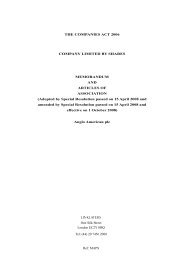
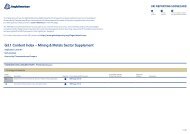
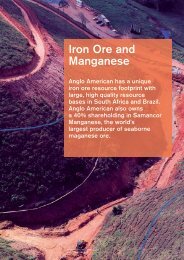
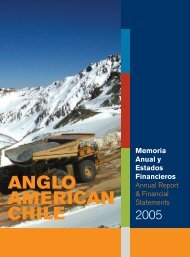
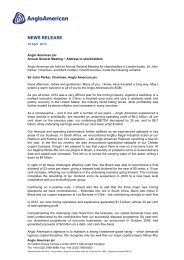
![English PDF [ 189KB ] - Anglo American](https://img.yumpu.com/50470814/1/184x260/english-pdf-189kb-anglo-american.jpg?quality=85)
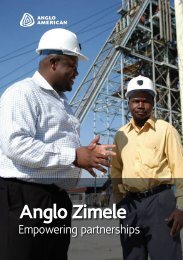

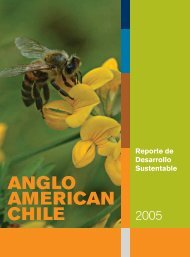
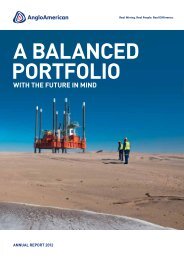
![pdf [ 595KB ] - Anglo American](https://img.yumpu.com/49420483/1/184x260/pdf-595kb-anglo-american.jpg?quality=85)
![pdf [ 1.1MB ] - Anglo American](https://img.yumpu.com/49057963/1/190x240/pdf-11mb-anglo-american.jpg?quality=85)
